Peter MALONE
Saturday, 09 October 2021 13:00
Anne Frank: Parallel Stories
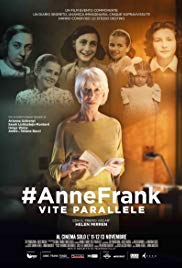
ANNE FRANK. PARALLEL STORIES
Italy, 2019, 92 minutes, Colour.
Helen Mirren, Martina Gatti.
Directed Sabine Fedeli, Anna Migotto.
Anne Frank would have turned 90 this year.
For the last 70 years, she has been a powerful focus of attention. There was the discovery of her diary and its publication, the support of her father, Otto Frank. There was a Broadway play. There were several film versions of her diary. There have been many documentaries. This commemorative documentary, while it focuses on Anne herself and the diary, it suggests in the title that there were many parallels of teenagers, Jewish teenagers in many European countries, who were eventually rounded up and killed. The point is made about how impoverished the world is because of the deaths of so much talent.
While this film has quite an amount of historic film footage, especially of the concentration camps, it also has a number of talking heads, survivors of the war, survivors of the Holocaust, their reminiscences and comment.
But the Italian filmmakers have a particular device for letting the audience hear quite a number of passages from the diary itself, giving the particular months and years of the entries in the diary, Anne in her early teens, moving towards 15, the letters she continually wrote to her imaginary penfriend, Kitty. Through these excerpts, the audience is able to build up a picture of Anne and the Frank family as well as the others who were hidden by locals in Amsterdam for two years before they were arrested.
For contemporary audiences, the filmmakers have asked Helen Mirren to be the communicator of these excerpts, building a replica of Anne Frank’s room in a studio in Mulan, having Helen Mirren enter, said at the desk, open an English version of the diary, and not only read with great expression, but also looking into the camera, communicating with the audience about the significance, the emotions, the impact of these excerpts.
At the same time, the filmmakers have another device of a girl, of Anne’s age, played by Martina Gatti, who has read the book, has been moved by it, has decided to go on a pilgrimage to the Anne Frank house, eventually arriving, absorbing the memories and atmosphere, making the empathetic link that she is the same age but has such a different life in the 21st-century.
There will be more films about Anne Frank – but this is a reminder that, had she lived, she would be 90 this year. However, in her short life and in her death, she has made a profound and continuing impact.
1. The impact of Anne Frank, her life, her diary, over the decades, in literature, theatre, film, documentary?
2. The title, the reminder that there were many other teenagers killed during the war, paralleling, though unknown, the well-known life of Anne Frank?
3. 2019, the year of Anne Frank’s 90th birthday?
4. The device of having Helen Mirren go to the room, the austerity of the reconstructed room, light and darkness, the desk? Helen Mirren at the desk, reading the excerpts, giving the months and years, highlighting the events in her development, the changes from 13 to 15, and Helen Mirren with her expressions, emotions, looking to camera, challenging the audience?
5. The device of the young girl, reading the book, getting to know Anne Frank, deciding to make the pilgrimage, her travel, the arrival in the room, her contemplation?
6. The talking heads, the memories of the war, the dangers, the presence of the Nazis, concentration camps?
7. The perennial audience for the stories of Anne Frank, her diary, the fact of two years within the apartment, moods, ups and downs, the writing of the diary? And the fact that it was found and promoted?
Published in Movie Reviews
Published in
Movie Reviews
Saturday, 09 October 2021 13:00
League of their own, A
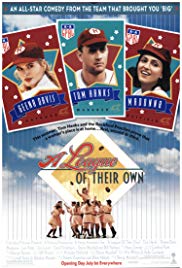
A LEAGUE OF THEIR OWN
US, 1992, 128 minutes, Colour.
Tom Hanks, Geena Davis, Madonna, Rosie O’ Donnell, Lori Petty, David Strathairn, Garry Marshall, Eddie Jones, Bill Pullman, Megan Cavanaugh, Jon Lovitz.
Directed by Penny Marshall.
A League of their Own was a very popular film with American audiences in 1992. Looking back on it from the perspective of the 21st century, it seems rather pioneering, especially about the presence of women in sports, maltreatment of sportswomen, some mockery, and not anticipating that in the 21st century women would be prolific in all kinds of sports, not only basketball, but baseball and the various codes of football.
This is a memorial and a tribute to the women who took up professional baseball during World War II with the absence of the men. Entrepreneurs promoted – but were prepared to drop the women when America started winning the war and the men would return, not anticipating the popularity of women in sport. (This is also the period in which that were developments in the presence of African- Americans in baseball, with Jackie Robinson.)
The action takes place during World War II, focusing on two young women, Dottie and her sister Kit (Geena Davis and Lori Petty)..
1. The title, the baseball leagues? The history? Men? World War and the women?
2. The film as a memoir and as a tribute? The finale in the Hall of Fame?
3. The film of the early 1990s – ahead of its time in terms of themes of women’s sport? Transformations in the 21st-century?
4. The film as a true story, the background of World War II, American involvement, the men leaving and serving? The status of baseball during the war? The entrepreneurs, the ideas of women’s teams, recruiting, forming a leave leak, competition, competitiveness, the slow response of the public, the final achievement?
5. The screenplay and the representation of men and women, chauvinism, putting women down, the mockery? Issues of stereotypes? The question of what would happen after the war – and the women returning to the kitchen (the scoffing of the idea that the men would go to the kitchen)?
6. Dottie’s story, seeing her as older, renewal of acquaintance with friends, her sister, sharing? Deaths? Memories?
7. Dottie and Kim, milking the cows, skill at baseball, the local matches, Dottie successful, Kim in the shadows?
8. The talent scout, the match, turning up, watching the milking, from the city? Trying to persuade Dottie? Her refusal, change of heart for Kim, hurrying to the train? Stopping on the way, the encounter with Marla and her father, her awkwardness, looks, her father’s plea?
9. The other girls, a range of characters, nice, the talent, the brisk and assertive types, Madonna and Rosie O’ Donnell? Background of families, men going to the war, messages about deaths?
10. The entrepreneur, ambitions, wealth, the idea of the baseball team? Winding down because of the end of the war and America succeeding in the war?
11. The assistant, his continued help, engaged for the teams, his promoting them, finding photo opportunities, their uniforms? The girls complying?
12. The slow audiences, some mockery, increasing numbers, the response to the uniforms?
13. The girls travelling, the collages of so many of the matches? Friendships, dressing rooms?
14. The spirit amongst the girls, sincere, wisecracks, the girl who couldn’t read and learning? The message and Betty’s husband dead?
15. Tom Hanks as Jimmy, the background of his drinking, his injury, successful past, with the entrepreneur, getting the job, his gradually changing, initially sharp-tongued, sleeping, underestimating the women? The discussions with Dottie, on the bus?
16. The boy, on the bus, the driver walking off, his upsetting people – and Jimmy throwing the ball at him at the end?
17. The rivalry between Kit and Dottie, Dottie not wanting, Kit’s sense of inferiority, the continued comparisons? The transfer to the rival team? The final match, Dottie and the physical clash? Some success for Kit, the two sisters talking together?
18. Dottie, at home in baseball, yet not wanting to stay? Bob’s return, their leaving, coming back to the game, his support of her?
19. A creative idea for the war and the war effort? The aftermath in the 20th century? Changes and women’s participation in sport in the 21st-century?
Published in Movie Reviews
Published in
Movie Reviews
Saturday, 09 October 2021 13:00
Maleficent: Mistress of Evil
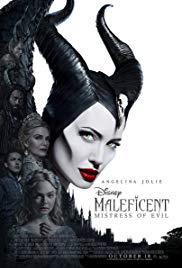
MALEFICENT: MISTRESS OF EVIL
US, 2019, 118 minutes, Colour.
Angelina Jolie, Michelle Pfeiffer, Elle Fanning, Harris Dickinson, Sam Riley,Chiwitel Ejiofor, Ed Skrein, Robert Lindsay, David Gyasi, Juno Temple, Lesley Manville, Imelda Staunton.
Directed by Joachim Honning.
The emphasis on the original, Maleficent, was on the wicked queen herself, magnificently embodied by Angelina Jolie. This was a remake of Sleeping Beauty, Elle Fanning as the little girl, object of the Queen’s malicious jealousy, rescued and growing up in the kingdom with Maleficent becoming her foster mother.
Maleficent, if she were in the mood, could well sue the filmmakers, especially those responsible for the subtitle for this sequel, Mistress of Evil. Maleficent is definitely not just of evil – the title is quite defamatory. Rather, Michelle Pfeiffer is Queen Ingreth, ice cold stare with inner malevolence, could also sue. She is definitely the mistress of evil.
Aurora is no longer a sleeping beauty but is intent on bringing peace between humans and pixies and fairy worlds, intent on marrying Prince Philip and bringing everyone together. Maleficent disapproves of the marriage, pessimistic about its outcome. Queen ingreth is even more deadly set against the marriage. She resents peace, resents the fairy world, despises her husband and puts him under a curse, makes demands of her son, Philip, and intends to go to war.
Elle Fanning is lovely as ever as Aurora but Harrison Dickinson is rather pro-faced as Philip.
Much of the film is war action, an extraordinary range of special effects, familiar human soldiers in their armour, all kinds of fairies and pixies, all taking wing, including Maleficent and a shape-changing crow (Sam Riley), swooping in attack, swooping to evade the fireballs fired at them.
Trapped by the Queen, Aurora does not need a prince’s kiss to go into action but shows herself a sturdy heroine. Ultimately, of course, the confrontation is between the two women and – no spoiler – Maleficent, despite seeming to die, will be triumphant.
One of the problems for some audiences is the presence of Angelina Jolie, not in the fact that she is Maleficent, but that for most of the time she just has to stand there, prominent cheekbones, dressed in black, the horns, not saying particularly much, looking like an icon rather than a personality. Which contrasts, profoundly, with the malice of Michelle Pfeiffer.
For many audiences, this will be welcome magic and fairytale. For others, it won’t have the magic and charm of the original.
1. The origins in Sleeping Beauty, the original film, the impact of Maleficent and Aurora? Anticipation of the sequel?
2. The title, Maleficent not necessarily the mistress of evil, rather Queen In Greece and evil?
3. The fantasy world, the city, the buildings, the parks and squares, castles? The world of the fairies and pixies, the Moors, the caves? The musical score?
4. The design, sets and decor, costumes? The special effects for the wide range of creatures?
5. The action sequences, special effects, the vast battles? The fairies in flight? The ammunition? The combat?
6. Aurora and her story, Maleficent being her mother? Her growing up, the encounters with Prince Philip, in love with him? The scene of his proposal? Maleficent refusing? His mother refusing? The support of his father?
7. The Queen in herself, exercise of power, the power of the curse, using it on Aurora, the curse of the king? Her rebuking her son? Warrior, the Lt, soldiers, on the battlements, not wanting peace, her decisions, action?
8. The alliances of the fixes in fairies, the getting to know one, the variety of warriors, their appearance, communication, tribal, hostilities? Becoming United? Borrow as a significant? The story of Canal, the pathos of his death?
9. The battles, the fights, the intervention of Maleficent?
10. The church, the fairies inside, the organist and the fumes? The patter of the three fairies?
11. The crew, his power of transformation, in human form, scaling the Castle, supporting Maleficent?
12. Aurora, in the Castle, the flowers and the curse of the Queen, her escape, going to the basement, the confrontation with the Queen, the winless pixie and his role, the others in the jars, confined her escaping, down the battlements?
13. Maleficent in herself, her something of an icon, her power, transformations, confronting the Queen – and turning her into a goat?
14. Prince Philip, the assistant, the calling of peace, the changes in attitudes? The wedding?
15. The happy ending, Maleficent giving her consent? The image of the goat? And peace prevailing?
Published in Movie Reviews
Published in
Movie Reviews
Saturday, 09 October 2021 13:00
Judy
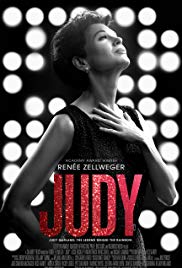
JUDY
US, 2019, 120 minutes, Colour.
René Zellweger, Jessie Buckley, Finn Whitrock, Rufus Sewell, Michael Gambon, Bella Ramsey, Andy Nyman, Darci Shaw, Richard Cordery.
Directed by Rupert Goold.
Once upon a time there was a Minnesota teenager called Frances Gumm. She was taken on by Louis B Mayer at MGM and was transformed into Judy Garland, star of The Wizard of Oz. She became a star of stars. But, after many successful movies, including her Oscar nomination for the memorable A Star is Born (1954), she went into decline even though she continued to do concerts around the world which cemented her popularity as a singer, a memorable singer.
This portrait of Judy Garland takes place during the last year of her life, down-and-out in Los Angeles, feted in London, marrying (briefly) for the fifth time, dying in 1969.
In many ways, this outline seems grim and glum. And it is… except…
Some years ago, Judy Davis portrayed Judy Garland in Me and My Shadow. Now it is the turn of René Zellweger, experienced actress, singer in Chicago, off-screen for some years. In her return to the screen, she powerfully inhabits the personality and character of Judy Garland, recognisable mannerisms and style, dramatising the erratic conflicts, performing the songs, belting out some of the numbers in Judy Garland style.
With the initial release of Judy, many of the reviewers and audiences proclaimed Oscar-worthy. Once you see René Zellweger on screen and hear her, you realise that this performance is one of depth, versatility, great talent, Oscar-worthy.
At the opening, Judy is in her mid-40s, travelling with her son and daughter, Lorna and Joe Luft, from her second husband, Sid Luft (Rufus Sewell). She is in debt, ousted from hotels, taking refuge with Luft, her children tired of moving around all the time and wanting to settle down, settle with him. She encounters a charming young man, Mickey Deans (Finn Wittrock) who will come to London, offer her dreams of debt-less happiness, but shatter her dreams even as she marries him.
She has been popular in London and an invitation from entrepreneur Bernard Delfont (Michael Gambon) is an offer that can save the day. The focus of the film is on the London concerts, her moods, the needs for drugs to sleep and calm her, her drinking, pickiness about small details of comfort, reluctant to go on stage but… Once she is there, feels the rapport from the audience, there is no holding back. This film offers a selection from her repertoire, including the Trolley song, Come on Get Happy, some sad ballads, and, appropriately and dramatically for the culmination, Somewhere Over the Rainbow.
But, all is not well. While there is a pleasing scene of pathos where two gay fans take her home and she cooks a meal, there are some mockers in the Talk of the Town audience and, twice, she really loses it. She apologises to Delfont, wants a second go but even collapses on stage. However, audience sympathy is drawn to her, even though we know she can be so irritating, when she goes back, meets the audience again, sings, weeps – and they sing with her.
Mention should be made of Jessie Buckley’s performance as Rosalind, given the impossible task of assisting Judy, trying to get her to the stage on time.
What is shocking, especially in the current consciousness of bullying and sexual harassment are the flashbacks to Louis B Mayer, his tyranny over the teenage singer, 18 hours work a day, harridan chaperone, her continually being told off, her being fed pills to keep her going, a slave to MGM. The consequences are to be seen in her life decline, her being a victim of the star system.
1. Audience knowledge of Judy Garland? Her films? Her career? Songs?
2. Her life story, origins in Minnesota, change of name, pressure from Louis B Mayer and the studios and the regime, bullying behaviour, drug dependence, the effect? Seen in flashbacks?
3. The 1960s, her decline, on stage with her children, in debt, turned out of hotels, going to Sid Luft, the issues of custody, her bond with her children, their not wanting to move but to settle, to stay with their father? The prospect of concerts in London?
4. Judy in the 1940s, the bullying scenes with Louis B. Mayer and his demands on her, her chaperone and her severity, working so many hours a day, the false birthday party, her diving into the water, rebuked by Mayer? The encounter with Mickey Rooney, her love for him? The pressure, tablets, questions about depression, her marriages, the scene of the encounter with Liza Minnelli? Her many marriages?
5. Meeting Mickey Deans, his personality, getting on well, his going to London and surprising her, the plans for the cinemas and her launching them, the impulse of marriage, the effect, the failure, the short-lived marriage?
6. Going to London, acclaim, Bernard Delfont and his management, Rosalind as her assistant? Arrival, hotel and criticisms, meeting the piano player, the guitar player, the heavy bookings, the fans, the hotel, her not wanting to rehearse? Her fears of going on stage, drinking, once on stage the rapport with the crowd?
7. In herself, her whims, erratic behaviour, exasperation for Rosalind, her doing her job? The contrast with the performances?
8. René Zellweger, embodying Judy Garland, manner and style, look, her own voice with the singing? Audiences, ups and downs, the encounter with the two gay men, search for a restaurant, going home with them, the scrambled eggs, their admiration, the story about imprisonment for gay men? The later coming to the show, wanting the money back – and hearing her sing, starting to sing Over the Rainbow, encouraging her?
9. Her moods, lack of sleep, the impact of the flashbacks, her drinking, her rudeness to the crowd, the apology to Delfont?
10. Mickey’s arrival, the promises, the change, exuberance? The marriage? The failure of his plans, her collapse?
11. Her devotion to her children, the scene of the phone call, their wanting to stay with their father?
12. Rosalind and the band leader, the afternoon tea, the cake, her wanting to return to the show?
13. The finale, singing, the audience response, Somewhere Over the Rainbow? Everybody joining in singing?
14. The portrait of Judy Garland, an interpretation of her life and career, the pressure on stars, coping and failing, consequences in older life? Her being a strong presence? And René Zellweger embodying all of this?
Published in Movie Reviews
Published in
Movie Reviews
Saturday, 09 October 2021 13:00
Conrad Boys, The
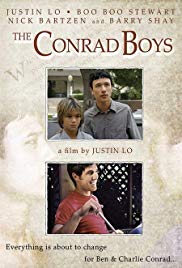
THE CONRAD BOYS
US, 2006, 94 minutes, Colour.
Justin Lo, Booboo Stewart, Nick Bartzen, Barry Shea, Nancy Hancock.
Directed by Justin Lo.
A reviewer observed that this story and its treatment is very much like one of those afternoon television programs dealing with family and children problems.
The Conrad boys are Charlie and Ben, Chinese mother, American father, the father alcoholic and having disappeared, the concerned mother collapsing and dying. Charlie is 19, Ben 10. Charlie has a strong sense of responsibility.
Charlie works at a diner, is a reader and writer, intending to go to college. His father, now reformed, turns up and wants to bond with his children, Charlie too suspicious of him untrusting, Ben not really knowing him but gradually bonding with him.
The film also has a gay theme. Charlie encounters a young man at the diner, helps him out, invites him home, beginnings of a relationship. However, the friend is something of a conman, is involved in a car theft, pursued by the owner of the car, trying to help Charlie by attacking his father. Charlie wants him to go. The father helps the young man by pretending to be police and getting rid of his pursuer. The man invites Charlie to go to New York with him – Charlie packs, thinks about Ben and returns home.
The film was produced, written and directed by Justin Lo who plays Charlie. This is his only film. It is one of those quiet films for young gay men, some screen images of themselves, their experiences, relationships, testing relationships and consequences.
1. The title, the focus on Charlie and Ben, the mother, her collapse and death? Being left alone? The difference in age? Charlie and his care? The absent father?
2. The small town setting, homes, donors, streets, atmosphere? The musical score?
3. The contribution of Justin Lo as his writer and director, producer and actor?
4. The setting, the mother and her Asian background, hard work and the massage, her collapse? The funeral? Her husband absent? Charlie taking responsibility, Ben, young, playful, moody? At school, his friend, later attacking him? Charlie brought before the principal? Ben and his counselling?
5. Their father returning, Ben’s hostility but not knowing him, Charlie and his disappointment, not trusting him? His father wanting to enter their lives again, his abandoning the family, his drinking, reform? The legal proceedings, issues of custody? His relationship, yet being reticent with the girlfriend? His Jewish observance, explaining to Ben, at the temple and Ben upset, Jordan and his punching him? His intervention, legal threats, to save Jordan from Vincent, doing it for Charlie? His making the shield for Ben? A hopeful future?
6. Charlie, his age, studies, entry to college, a reader, working at the diner, friendship with Tori, her babysitting? The encounter with Jordan? Conversation at the diner? Jordan, his story, ambiguity, travels, writing, the gradual unfolding of his story, with Vincent, the stealing of the car, owing the money? The police? Phoning other friends in town? His staying at the hotel, his card not working? Asking to stay with Charlie, the outing with Charlie in the room, the sexual advances? Ben seeing them on the couch, his being upset? Trying to deal with his father, with Ben going to stay with his father, his reaction to Jordan punching his father, Jordan leaving, returning, inviting Charlie to go with him, packing, thinking about Ben, returning?
7. The treatment of themes of family, absentee father and drinking, returned, relationships? Children growing up? The sexuality themes, Charlie and his orientation, Jordan and the attraction? Tori and her support?
8. The final scene of the two sons playing with their father – hopeful?
Published in Movie Reviews
Published in
Movie Reviews
Saturday, 09 October 2021 13:00
Eulogy, The
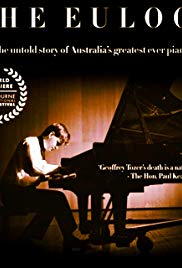
THE EULOGY
Australia, 2018, 98 minutes, Colour/black and white.
Richard Gill, Paul Keating.
Directed by Janine Hosking.
A eulogy for whom? The answer is, Geoffrey Tozer. Those familiar with the Australian musical world, musicians, performers, recitals, orchestral concerts, will know Geoffrey Tozer as one of Australia’s most talented and successful pianists.
A eulogy by whom? The answer is, Paul Keating. Those familiar with Australian politics (and the young children shown in class at a music school in Sydney don’t seem to have heard of him) will have all kinds of opinions about Keating but will probably consent that he was prime minister who had a great love of the arts.
Geoffrey Tozer died in some destitution in 2009. Raised a Catholic, but not practising, he was buried from St Patrick’s Cathedral Melbourne. And Paul Keating gave the eulogy. Rather than rely on footage from the time, the former prime minister was persuaded to re-enact the event, walking solemnly up the aisle in the Cathedral, delivering the eulogy with excerpts continuing throughout the film, walking back down the aisle. Paul Keating can be very passionate in his outbursts (and there is one here when he defends his creative fellowships in the federal Parliament, laying into the opposition) and, in the eulogy, he is highly critical of the music establishments in Sydney and Melbourne, almost making them responsible for Tozer’s death.
Respected conductor and music educator, Richard Gill (who sadly died soon after the film was completed) is the guide throughout this film, not having met Tozer, Gill is curious about him as a person and his talent, visiting his home, interviewing a range of people, raising questions, suggesting answers, a quest which become something of a pilgrimage, not without the ability to make some objective judgements about the musician and his life and behaviour.
Fortunately, Tozer’s mother was devoted to home movies and so we see the background of Geoffrey’s upbringing. His mother was a music teacher and, one might say, took possession of him and his talent. Some of her comments are voiced by actress, Rachael Blake. He left school at 13, toured the world as a child prodigy. He was feted and honoured as a great talent. Fortunately, there are many excerpts of his performances, the film audience able to appreciate his virtuosity, his hand and finger skills, his ability to improvise, his working with orchestras (including a Chinese orchestra in 2002) as well as recitals. Those interviewed are praising in his range of music, his absorbing music, his knowledge, his creative interpretations.
In many ways, the most of his life, Tozer had no life outside his music, living with his mother until her death in the 1990s. There was a mystery about his father, not Tozer, and no real personal life until, at the time he turned 50, falling in love with a musician, Paul Brickhill. But, it is difficult to discern the reasons and pressures for his turning to drink, he was an alcoholic. In his final years, he suffers some neglect, lets himself go, so that he died in rather squalid conditions at his home in Melbourne.
There are many testimonies from friends, especially the curator of his home and memorabilia, testimonies from Paul Brickhill, and, all the way through, excerpts from the eulogy.
He was given two creative fellowships from the Labor government, subject to criticism, Keating helping him in buying a former Queanbeyan convent and doing it up with the intention of having it as a music school – but the project failed. Where Tozer did succeed at that time was in his discovery of the Russian composer, Nikolai Medtner, and his devoting himself to appreciation and understanding and the recording of his complete works. Which means there are many recorded testimonies to his artistic skills and talent.
One of the testimonies is by journalist Stuart Rintoul who wrote an extensive article on him when Tozer died. Prominent members of Sydney and Melbourne orchestral organisations were incensed at the eulogy and its implications. However, Richard Gill interviews one of the executives of the time and, evenhandedly, she does explain the effect of genius and erratic and unreliable behaviour on conductors, orchestras, rehearsals.
There have been comments throughout the film on the Tall Poppy Syndrome. If only the ethos word to collaborate with the tall Poppy rather than an impetus to cut it down.
Published in Movie Reviews
Published in
Movie Reviews
Saturday, 09 October 2021 13:00
Boo 2! A Madea Halloween
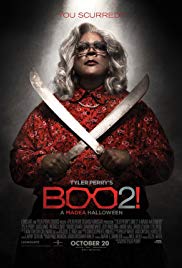
BOO! A MADEA HALLOWEEN
US, 2016, 103 minutes, Colour.
Tyler Perry, Cassie Davis, Patrice Lovely, Bella Thorne, Lexi Panterra, Diamond White.
Directed by Tyler Perry.
BOO 2! A MADEA HALLOWEEN
US, 2017, 101 minutes, Colour.
Tyler Perry, Cassie Davis, Patrice Lovely, Diamond White, Lexi Panterra.
Directed by Tyler Perry.
Tyler Perry has written and directed a number of comedies as well as serious explorations of relationships. He has also acted in a number of serious films including playing James Patterson’s Detective, Alex Cross.
Many of his comedies, also prepared for the stage, have a character called Madea. Madea is played by Perry himself. She is a harridan of a woman, separated from her husband Brian (also Perry) rather profligate in her behaviour, abandoning him and her children. Perry also plays the eccentric old Uncle Joe.
Perry is not the favourite writer and director of many African Americans, including Spike Lee. And, Perry has been nominated several times for the Razzies, winning the Razzie as worst actress for the sequel to this film.
The films are designed for an African- American audience for a popular outing. They don’t necessarily travel well beyond the target community. Non-Americans? may have great difficulties with Perry’s sense of humour.
It is interesting to watch Tyler Perry being something of himself, especially here in the character of Brian, a seemingly quiet and balanced man compared with his other incarnations.
This is a family story as are so many of the others. There is a focus on the daughter, Brian and his custody, calling in Madea and other members of the family to back him up in his discipline for his daughter who wants to go out at Halloween with the frat community and her girlfriends.
There is a lot of frat school shenanigans, raucous and randy boys, the girls trying to be glamorous, outings, the touch daring, defying parents.
Brian is sometimes diffident in exercising authority over’s daughter but then is pushed by Medea and the other characters, including the visiting aunt.
It is Halloween, so various devices are thought up in order to control the girls and their outings, one of the girls being the daughter of a preacher and able to set up a ghostly device for scares all round.
So, there is a range of comic situations, context of Halloween and trick or treat, superstitions and ghosts, rituals, issues of the young people wanting to get out and beyond the control of their parents, some frat sequences, some prison sequences, some family discussions.
Very much for its target audience.
Boo 2! Is much the same, more of the same, the same characters, the dominating Madea, Brian and his meekness, concern about his daughter, Tiffany, her girlfriends, and the rest of the family turning up to celebrate Tiffany’s 18th birthday – and her being underwhelmed.
Tyler Perry fans have enjoyed the film – but, with its more of the same, it became tiresome to many audiences, even some of Tyler Perry’s fans.
And, Tyler Perry did win the Razzie as worst actress for this film!
Published in Movie Reviews
Published in
Movie Reviews
Saturday, 09 October 2021 13:00
Boo! A Madea Halloween

BOO! A MADEA HALLOWEEN
US, 2016, 103 minutes, Colour.
Tyler Perry, Cassie Davis, Patrice Lovely, Bella Thorne, Lexi Panterra, Diamond White.
Directed by Tyler Perry.
BOO 2! A MADEA HALLOWEEN
US, 2017, 101 minutes, Colour.
Tyler Perry, Cassie Davis, Patrice Lovely, Diamond White, Lexi Panterra.
Directed by Tyler Perry.
Tyler Perry has written and directed a number of comedies as well as serious explorations of relationships. He has also acted in a number of serious films including playing James Patterson’s Detective, Alex Cross.
Many of his comedies, also prepared for the stage, have a character called Madea. Madea is played by Perry himself. She is a harridan of a woman, separated from her husband Brian (also Perry) rather profligate in her behaviour, abandoning him and her children. Perry also plays the eccentric old Uncle Joe.
Perry is not the favourite writer and director of many African Americans, including Spike Lee. And, Perry has been nominated several times for the Razzies, winning the Razzie as worst actress for the sequel to this film.
The films are designed for an African- American audience for a popular outing. They don’t necessarily travel well beyond the target community. Non-Americans? may have great difficulties with Perry’s sense of humour.
It is interesting to watch Tyler Perry being something of himself, especially here in the character of Brian, a seemingly quiet and balanced man compared with his other incarnations.
This is a family story as are so many of the others. There is a focus on the daughter, Brian and his custody, calling in Madea and other members of the family to back him up in his discipline for his daughter who wants to go out at Halloween with the frat community and her girlfriends.
There is a lot of frat school shenanigans, raucous and randy boys, the girls trying to be glamorous, outings, the touch daring, defying parents.
Brian is sometimes diffident in exercising authority over’s daughter but then is pushed by Medea and the other characters, including the visiting aunt.
It is Halloween, so various devices are thought up in order to control the girls and their outings, one of the girls being the daughter of a preacher and able to set up a ghostly device for scares all round.
So, there is a range of comic situations, context of Halloween and trick or treat, superstitions and ghosts, rituals, issues of the young people wanting to get out and beyond the control of their parents, some frat sequences, some prison sequences, some family discussions.
Very much for its target audience.
Boo 2! Is much the same, more of the same, the same characters, the dominating Madea, Brian and his meekness, concern about his daughter, Tiffany, her girlfriends, and the rest of the family turning up to celebrate Tiffany’s 18th birthday – and her being underwhelmed.
Tyler Perry fans have enjoyed the film – but, with its more of the same, it became tiresome to many audiences, even some of Tyler Perry’s fans.
And, Tyler Perry did win the Razzie as worst actress for this film!
Published in Movie Reviews
Published in
Movie Reviews
Saturday, 09 October 2021 13:00
Green Light/ 2018
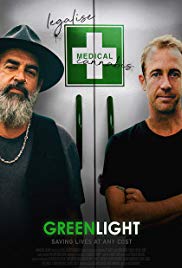
GREEN LIGHT
Australia, 2019, 73 minutes, Colour.
Directed by Ned Donohoe.
The action in this film was shot in the first part of 2018. It places itself as a contribution to the ongoing discussion about medicinal marijuana, and issues of public opinion, Australian legislation, availability of prescriptions and supply, the risks to those involved in supply, especially prospect of prison.
The advantage of the film in alerting the public at eliciting some interest and sympathy is the choice of the two central characters, Luke and Nick, who explain how they felt some call to help other people, have been able to produce the two strains of medicinal marijuana and their being able to supply. They are shown to be on call 24/7, phone calls and texts from seriously ill people, their families and carers.
And the advantage in seeing Luke and Nick is that the early part of the film introduces them well, ordinary blokes, one might say, Luke with a son, Nick with three daughters and a pregnant partner. They listen. They are sympathetic. And, while trying to be emotionally balanced, have great empathy with those they deal with. At one stage they remark that the dealer is the healer!
The choice of those in need is very varied but elicits both shock and compassion from the audience. There is an elderly man with an extraordinary growth covering the one side of his face. There is a dwarf who suffers from the most fragile of bones, continually fracturing. There is a young child with cancer. There is a martial arts instructor who also suffered from cancerous eruptions.
The audience is in no doubt that these men and women are certainly in need of some kind of medicinal and psychological and emotional solace and that the use of the medicinal marijuana provides this – but also seems to provide in many cases movements towards healing. And, for human interest, they also treat a horse with a growth on its nose, see its treatment, its improving – and an exhilarating ride for Nick.
What makes the men’s dedication even more significant is that they both explain how they had severe drug problems in their own lives, which challenged them, and they decided that they did have a call to healing others.
Different views are expressed about issues of law and legislation, some glimpses of meetings to discuss these issues, the continued tension as the two men go on their rounds. (And a great deal of scenes of nature and beauty.)
So, we have a topical documentary working on stories of real people rather than just simply analysing information, facts, issues of health, of law and politics.
Published in Movie Reviews
Published in
Movie Reviews
Saturday, 09 October 2021 13:00
Avenging Evil
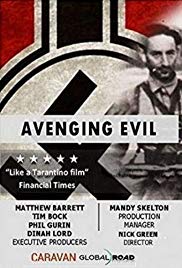
AVENGING EVIL
UK/US, 2018, 79 minutes, Colour/black and white.
Directed by Nick Green.
This is a documentary about the Nazi invasion of Lithuania, the rounding up of the Jewish population, the brutality of exterminations.
It is also a documentary about a plan for revenge, survivors of the Nazi atrocities in camps, their coming together after the end of World War II and planning as a group the extermination of 6 million Germans.
The film explains how the leader of the group, Abba Kovner, student during the war, later a poet, had tapes of various meetings of the group – not made available until 1985. There are many excerpts from the tapes, the voice of Kovner himself, and other members of the group and their relatives and children.
The film has a great deal of historical footage, from the invasion of Lithuania and black-and-white records of the time. There are also interviews with members of the group, a focus on Nuremberg after the war leading to the trials and the presence of Americans in Germany.
The film is something of a docudrama as actors re-create various episodes, meetings, the attempts to use poison in rivers and water systems and, eventually, in the kitchen of the camp guarded by German soldiers.
There are some contemporary interviews from the period – and many of the protagonists in later life, reflecting on what they did, their attitudes for revenge, many of them still bitter into the 21st-century. To that extent, the voices are a powerful witness.
With the plan to kill so many, there are details of what the planners did, especially the acquiring of poisons, storing them. There are also the logistical difficulties in carrying out the plan. As it turned out, a number of the soldiers were affected by the poison in the loaves in the camp – but no deaths recorded.
The film is a challenge to Jewish memories, memories of anti-Semitism in Europe before and during the war, the atrocities of the concentration camps.
Then, there are the attitudes of the audience as they learn of the plans, hear the intensity of the motivations of the members of the group, respond to their reflections on the actions of decades earlier.
To that extent, in a short running time, the film is disturbing and challenging.
Published in Movie Reviews
Published in
Movie Reviews